- Clone
- GL3 (See other available formats)
- Regulatory Status
- RUO
- Other Names
- T cell receptor γ/δ
- Isotype
- Armenian Hamster IgG
- Ave. Rating
- Submit a Review
- Product Citations
- publications
| Cat # | Size | Price | Quantity Check Availability | Save | ||
|---|---|---|---|---|---|---|
| 118119 | 125 µL | £128 | ||||
| 118120 | 50 µg | £163 | ||||
T cell receptor (TCR) is a heterodimer consisting of an α and a β chain (TCR α/β) or a γ and a δ chain (TCR γ/δ). TCR γ/δ belongs to the immunoglobulin superfamily, which is involved in the recognition of certain bacterial and tumor antigens bound to MHC class I. γ/δ TCR associates with CD3 and is expressed on a T cell subset found in the thymus, the intestinal epithelium, and the peripheral lymphoid tissues and peritoneum. Most γ/δ T cells are CD4-/CD8- although some are CD8+. T cells expressing the γ/δ TCR have been shown to play a role in oral tolerance, tumor-associated tolerance, and autoimmune disease. It has been reported that γ/δ T cells also play a principal role in antigen presentation.
Product DetailsProduct Details
- Verified Reactivity
- Mouse
- Antibody Type
- Monoclonal
- Host Species
- Armenian Hamster
- Immunogen
- C57BL/6J intraepithelial lymphocytes
- Formulation
- Phosphate-buffered solution, pH 7.2, containing 0.09% sodium azide and BSA (origin USA).
- Preparation
- The antibody was purified by affinity chromatography and conjugated with Brilliant Violet 421™ under optimal conditions.
- Concentration
- µg sizes: 0.2 mg/mLµL sizes: lot-specific (to obtain lot-specific concentration and expiration, please enter the lot number in our Certificate of Analysis online tool.)
- Storage & Handling
- The antibody solution should be stored undiluted between 2°C and 8°C, and protected from prolonged exposure to light. Do not freeze.
- Application
-
FC - Quality tested
- Recommended Usage
-
Each lot of this antibody is quality control tested by immunofluorescent staining with flow cytometric analysis. For immunofluorescent staining using the µg size, the suggested use of this reagent is ≤0.25 µg per million cells in 100 µl volume. For immunofluorescent staining using the µl size, the suggested use of this reagent is 5 µl per million cells in 100 µl staining volume or 5 µl per 100 µl of whole blood. It is recommended that the reagent be titrated for optimal performance for each application.
Brilliant Violet 421™ excites at 405 nm and emits at 421 nm. The standard bandpass filter 450/50 nm is recommended for detection. Brilliant Violet 421™ is a trademark of Sirigen Group Ltd.
Learn more about Brilliant Violet™.
This product is subject to proprietary rights of Sirigen Inc. and is made and sold under license from Sirigen Inc. The purchase of this product conveys to the buyer a non-transferable right to use the purchased product for research purposes only. This product may not be resold or incorporated in any manner into another product for resale. Any use for therapeutics or diagnostics is strictly prohibited. This product is covered by U.S. Patent(s), pending patent applications and foreign equivalents. - Excitation Laser
-
Violet Laser (405 nm)
- Application Notes
-
The GL3 antibody has been shown to be useful in identifying γ/δ T cells by flow cytometry and immunohistochemistry and depleting γ/δ T cells in vivo. Additional reported applications (for the relevant formats) include: immunoprecipitation1, immunohistochemistry of acetone-fixed frozen sections2,6, and in vivo depletion of γ/δ T cells3-5.
-
Application References
(PubMed link indicates BioLegend citation) -
- Goodman T, et al. 1989. J. Exp. Med. 170:1569. (FC, IP)
- Cardona AE, et al. 2003. Infect. Immun. 71:2634. (IHC)
- Kapp JA, et al. 2004. Immunology 111:155. (Deplete)
- Skelsey ME, et al. 2001. J. Immunol. 166:4327. (Deplete)
- Ke Y, et al. 1997. J. Immunol. 158:3610. (Deplete)
- Podd BS, et al. 2006. J. Immunol. 176:6532. (IHC)
- Kasten KR, et al. 2010. Infect. Immun. 78:4714. (FC) PubMed
- Stadanlick JE, et al. 2011. J. Immunol. 187:664. PubMed
- Van Belle AB, et al. 2012. J. Immunol. 188:462. PubMed
- Product Citations
-
- RRID
-
AB_10896753 (BioLegend Cat. No. 118119)
AB_2562566 (BioLegend Cat. No. 118120)
Antigen Details
- Structure
- Ig superfamily, associates with CD3 complex.
- Distribution
-
T cell subset in thymus, intestinal epithelium, peripheral lymphoid tissues and peritoneum, most γ/δ T cells are CD4-/CD8-, some are CD8+.
- Function
- Antigen recognition; γ/δ T cells are thought to play a role in tolerance.
- Ligand/Receptor
- Some bacterial or tumor antigens bound to MHC class I.
- Cell Type
- Epithelial cells, T cells, Tregs
- Biology Area
- Adaptive Immunity, Immunology
- Molecular Family
- TCRs
- Antigen References
-
- Skarstein K, et al. 1995. Immunology. 81:497.
- Harrison LC, et al. 1996. J Exp Med. 184:2167.
- Wildner G, et al. 1996. Eur J Immunol. 26:2140.
- Brandes M, et al. 2005. Science. 309:264.
- Gene ID
- 110066 View all products for this Gene ID 110067 View all products for this Gene ID
- UniProt
- View information about TCR gamma/delta on UniProt.org
Related FAQs
- What is the F/P ratio range of our BV421™ format antibody reagents?
-
It is lot-specific. On average it ranges between 2-4.
Other Formats
View All TCR γ/δ Reagents Request Custom ConjugationCustomers Also Purchased
Compare Data Across All Formats
This data display is provided for general comparisons between formats.
Your actual data may vary due to variations in samples, target cells, instruments and their settings, staining conditions, and other factors.
If you need assistance with selecting the best format contact our expert technical support team.
-
Brilliant Violet 421™ anti-mouse TCR γ/δ
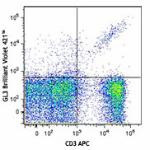
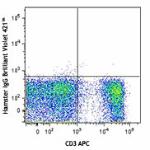
-
Purified anti-mouse TCR γ/δ
-
Biotin anti-mouse TCR γ/δ
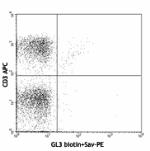
C57BL/6 lymph node cells stained with biotinylated GL3 and C... -
FITC anti-mouse TCR γ/δ
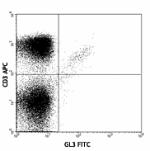
C57BL/6 lymph node cells stained with GL3 FITC and CD3 (145-... -
PE anti-mouse TCR γ/δ
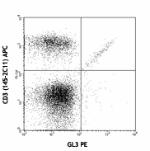
C57BL/6 splenocytes stained with CD3 (145-2C11) APC and GL3 ... 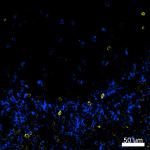
Confocal image of C57BL/6 mouse thymus sample acquired using... -
APC Anti-mouse TCR γ/δ
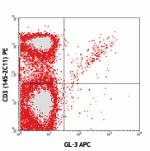
C57BL/6 mouse lymph node cells stained with CD3 (145-2C11) P... 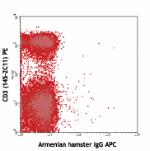
C57BL/6 mouse lymph node cells stained with CD3 (145-2C11) P... -
PerCP/Cyanine5.5 anti-mouse TCR γ/δ

C57BL/6 mouse splenocytes were stained with anti-mouse CD3ε ... -
PE/Cyanine7 anti-mouse TCR γ/δ

C57BL/6 mouse splenocytes were stained with CD3 APC and TCR ... -
Alexa Fluor® 488 anti-mouse TCR γ/δ
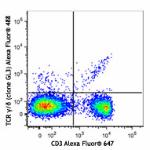
C57BL/6 mouse splenocytes were stained with CD3 Alexa Fluor®... 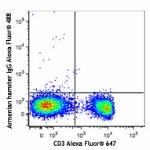
-
Brilliant Violet 605™ anti-mouse TCR γ/δ
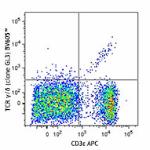
C57BL/6 mouse splenocytes were stained with CD3ε APC and TC... -
Brilliant Violet 510™ anti-mouse TCR γ/δ
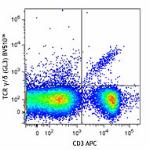
C57BL/6 mouse splenocytes were stained with CD3 APC and TCR ... 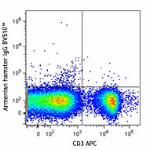
-
Alexa Fluor® 647 anti-mouse TCR γ/δ
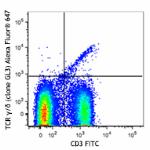
C57BL/6 mouse splenocytes were stained with CD3 FITC and TCR... 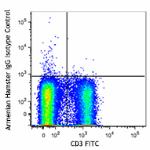
-
APC/Fire™ 750 anti-mouse TCR γ/δ
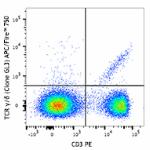
C57BL/6 mouse splenocytes were stained with CD3 PE and and T... 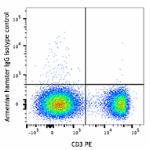
-
TotalSeq™-A0121 anti-mouse TCR γ/δ
-
Ultra-LEAF™ Purified anti-mouse TCR γ/δ
-
TotalSeq™-C0121 anti-mouse TCR γ/δ
-
APC/Cyanine7 anti-mouse TCR γ/δ

C57BL/6 mouse splenocytes were stained with anti-mouse CD3 F... -
TotalSeq™-B0121 anti-mouse TCR γ/δ
-
Brilliant Violet 650™ anti-mouse TCR γ/δ

C57BL/6 mouse splenocytes were surface stained with anti-mou... -
Brilliant Violet 711™ anti-mouse TCR γ/δ

C57BL/6 splenocytes were stained with anti-mouse CD3 FITC an... -
Spark Red™ 718 anti-mouse TCR γ/δ (Flexi-Fluor™)
-
Spark Blue™ 574 anti-mouse TCR γ/δ (Flexi-Fluor™)
-
Spark Blue™ 550 anti-mouse TCR γ/δ (Flexi-Fluor™)
 Login / Register
Login / Register 



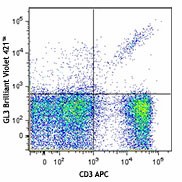









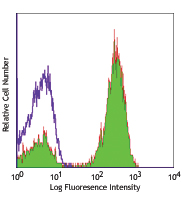
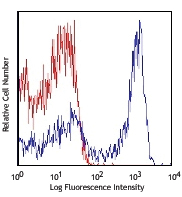
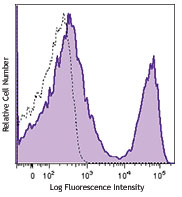




Follow Us